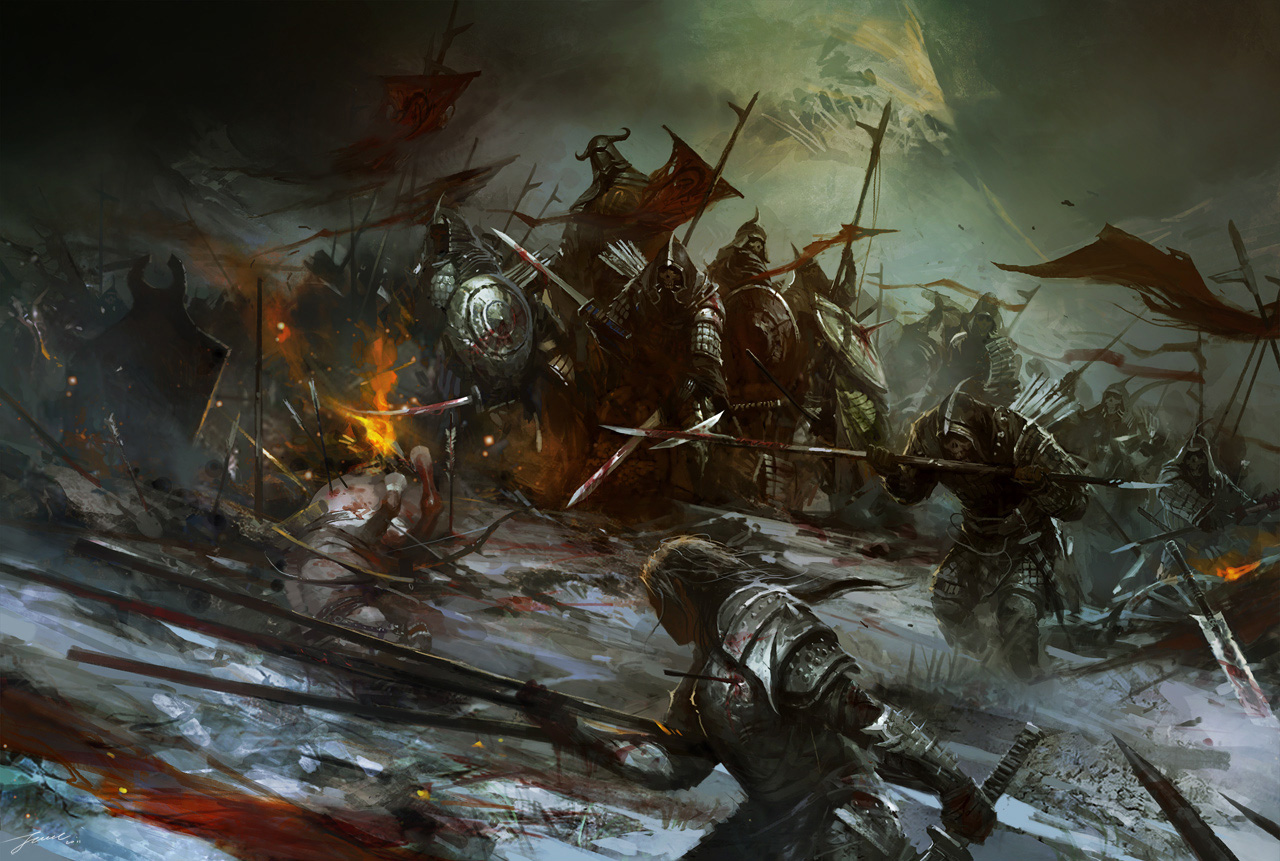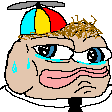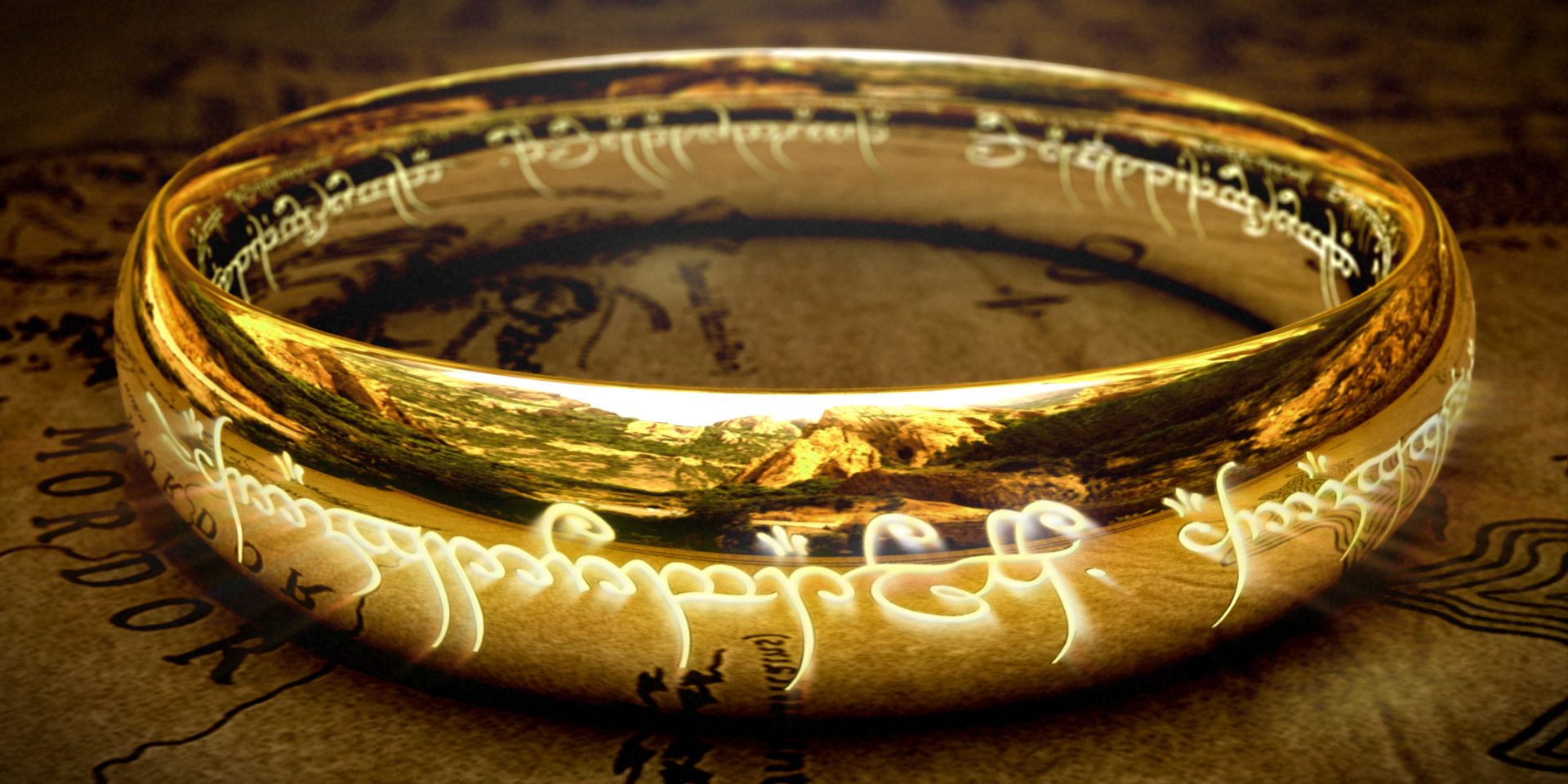Deity
A deity is a person who is, either consciously or subconsciously, able to use divine energy to manifest their will on the world. Their aura also tend to evolve into much more complex shape, allowing them to surpass common folk in terms of arcane magic as well. However, aside from those advantages, deities are no different from the rest of their race. They still grow old, unless they use divine magic not to, they can still have children, and even a god can be killed with a good strike should it come to it.You still dreaming about killing dragons and saving kingdoms, eh boy? Many boys just like you chose to ride with them heroes away from home villages, and most of them never made it back. Those two here, who are able to do that kind of stuff are not the same as the common folk like you and me, so be smart and forget about it. And you two here better be on your way to those adventures of yours. There is little difference between you and us, old man. Except for your lack of passion and determination.
Power
There are several sources of power available for the deities. In fact, anyone can use them, but no ordinary people can gather divine energy properly. It becomes easier the more complex the one's aura is. First and the most fundamental source is the faith of the others, not necessarily their followers. The more known the deity is, the stronger it usually is. Besides, many gods rely heavily on others' emotions as a source of divine energy. Due to the effect that energy is having on its user, most of them become associated with one or two emotions and make them their primary source of power. And negative emotions, being much stronger than the positive, are the ones so many gods choose to feed on, becoming the embodiment of them and a curse to many of their race. Finally, there is nothing forbidding the deities to use not divine but arcane energy. Moreover, their complex aura allows to gather and accumulate much more of it, going as far as being able to extract magic out of items and even life force out of living creatures. Here also goes the fact that most deities spend, to some extent, the gathered divine energy on improving their own body and creating or obtaining powerful magic items, making any powerful deity a deadly enemy even if he is not using the divine energy. In pursuit of that power, some of them even go as far as to become of monstrous appearance, giving up their humanoid form for better efficiency. Deities can also create creatures to serve them, such as god's avatars, and some races even believe themselves to be created by particularly powerful deities.Career
Career Progression
The Ladder to the Sky is a long and thorny one. Make just one wrong step, and you turn into nothing.The deities can be either born as such or become them after acquiring enough of the divine energy. They have no differences past the point of becoming a deity, though those who became a deity tend to be stronger than those who were born. They had to be outstanding to become a deity, to begin with. There are several ranks that a deity can have, defined by how complex their aura is. Once a deity's aura reaches its limit on the current level, it can shape further no longer. A deity then has to either stay like that or to fill up the aura with energy to the edges of it, to the point it can barely hold it. If that state were to be achieved, the aura would start to evolve, cutting off numerous small, ineffective parts and drastically changing. That is the next step for a deity on his Ladder to the Sky, as many call their path to power and the same way people become actual gods. There are, however, certain risks in taking a step up. The aura, overfilled with divine energy, can tear during its evolution. That creates wounds one could hardly heal, and they hurt like hell; even worse is that the all of the accumulated energy starts to leak out through those wounds. In fact, severely damaging one's aura is an excellent way to kill anyone, including deities.
Ranks
As long as you land a proper strike with a proper weapon, it does not matter who your enemy thinks himself to be.Demigod — a person able to subconsciously use divine energy. It is not proper divine magic yet, as they cannot directly make the world do what they want, but demigods are generally much stronger, talented and hard to kill than usual people. A good strike with a sword would still often do the job though. Most of the renowned heroes and feared monsters are usually demigods, often because they are already acknowledged by people but do not yet know how to use that power. Lesser God — a demigod that has learned how to use its power consciously to make demands of the world. They can heal themselves in an instant using divine magic. They can crush your bones just by willing to do it. They can do anything as long as they have enough divine energy at their disposal. Sadly for them, they do not have much of it. A few solid wounds can be something a lesser god would generally not be able to recover from, and a pierced heart or brain is still an instant death. And as they have not yet gone through the procedure of aura's evolution, Lesser Gods have little difference with ordinary people except for the usage of divine magic, a relatively modest one considering the capabilities of their aura. God — a successful evolution of a lesser god, each god has its individual aura pattern and stands well above common folk in terms of their capabilities. It is then that one becomes a true god, often deciding to specialise in something. Usually well superior in magic and in physical abilities, able to gather divine energy from the mere fact of being recalled, they are truly on another level, but they are not immortal nor omnipotent. At this point, a god becomes so dependent on divine energy that his aura runs dry without it. Endless years of a painful death is what awaits a god that has no divine energy despite however good they can be with arcane magic, and the more complex the god's aura is, the longer they can survive on what little power they have left. That said, the strongest gods can even live for thousands of years in such a state. Great God — a collective name for any god who has undergone more than one evolution; they are often the reason why their countries manage to survive. Though they usually still retain their specialisation, is it not a rare case for a Great God to be considered a patron and protector of the country or even the entire race. Many of them choose another way and become great gods because of being believed in by people from different societies and races, offering no protection from the enemies but purely the help with matters of their specialisation. A fight between great gods is one of the greatest catastrophes that can happen to any place. And even among those who are could become great gods, most do not dare to do it due to both the danger of becoming one and the danger that comes after it. Aspect — a supreme power able to define the very shape of the world. Perceived by most people as no gods but rather as sheer manifestations of nature, they embody a certain aspect of the world and are believed to be almighty when acting within their specialisation. If an Aspect were to die, all the Great Gods of the world with a matching specialisation would have both their souls and their energy taken away, serving as a matter from which a new being is born. According to the theory popular among the scientific circles, the souls inside of it start to fight each other until all weaker ones are perished and consumed, and the surviving ones merge together. Considering the nature of the process, some people believe that the world itself is what makes sure that there is never a missing Aspect. Some claim that an ultimate god that stands above all else does that. Whatever the case is, it is believed that Aspects have no names and no personalities, though Listeners of Kimentar would disagree on that. They believe that their god is an Aspect of Chance, a former Great God that managed to defeat and subdue the souls of all other Great Gods that were affected by the process. Creator — the one who has created the world and stands above all gods, believed by some to create Aspects as well. Despite that claim being constantly voiced, no strong evidence was ever found of the Creator's mere existence, never mind anything else.
Payment & Reimbursement
If some god made it possible to atone for any sin by paying money, next day he would have been probably the richest man in the world, and his temples would be full with nobles and merchants.People would often sacrifice coins and things of value to the gods as an act of love and loyalty or out of mere fear. It is not like anyone have ever heard about a deity in need of that money unless they wanted to engage in mortal politics. However, many people still view the act of sacrificing money as an easy way to prove themselves worthy.
Other Benefits
Perception
Purpose
Social Status
Demographics
History
History? You mean the one mainly told to us by the gods' servants, THAT history?Eight to ten thousand years ago, when only a few of nowadays known races existed, the gods were of little importance. There are not many books about that time, but it is certain that elves back then solely worshipped their Red Trees, thinking of other deities as merely the servants to those godlike trees. None of the elven gods was ever seen on the battlefield. Dwarfs respected their gods much more, believing them to be the ancestors of their race. Becoming a deity would mean establishing your own clan of descendants, but they still possessed influence only that of a father to their clan, seen as elders rather than gods. What did the lizardfolk worship, if anything at all, is still a mystery to these days. The only race that existed then and now and seems to have actual gods were the dragons. It is believed that Dragon Lords, creatures of rare age and power, are in fact the deities from among their race. According to the chronicles, they were the one to lead and rule the rest of their kin, including on the field of battle. Yet, only the gods can know whether it is true or not now. The change happened at the dark time of Unemorin the Cursed's terror. In response to his unbelievable act of sacrificing a priest on their god's own altar, for the first time in known history, the god intervened directly. After that, the gods started to intervene more and more in the matters of common folk, becoming much more powerful and the ones to be accounted for. Yet, most of them still have a long road ahead to become the true rulers of their societies, especially considering the fact that the Dragon Lords are gossiped to have been seen in the sky once again.
Sprays
Do not get cocky just because you, by mere chance, got a portion of some god's powers. Any kid still need to respect the elders!Some small parts of the aura are almost always cut off during the evolution to create a better pattern, and they form "sprays". Those sprays, basically parts of a deity's own aura filled with divine energy, fly in all directions. Sooner or later, a spray meets someone or something on its way, and whatever that is becomes something else but ordinary. Extremely talented spellcasters and dangerous monsters, clerics and shamans, demigods and even gods, anyone can be born from it. Sometimes even two or more sprays drop on the same spot though that is a rather rare case. That effect also depends on the level of a deity a lot. More advanced deities have a lot more energy in their aura, and they lose much more of their aura during the process of evolving. A single evolution of one of a strongest Great Gods could fill the land around with monsters and heroes, or even dozens of new gods, for it requires a tremendous amount of energy to be collected and tens of thousands of those small cuts.
Remove these ads. Join the Worldbuilders Guild






The concept of magical power deriving from ones renown is a really cool idea. I'm interested to hear the backstories of the deities and their conflicts to maintain or build renown. You mentioned deities who mutilate or ascend their humanoid form to increase efficiency, and it made me think of a dark / fear related deity, who grows its power through propagating a myth, scary story, or urban legend.
Yes, it is basically the reason deities do help common people in the first place — not because they have or necessary want to, but because they need to maintain their own renown to keep power coming. Investments of a sort. And true, many would try to make their evil deeds as public as possible, and it's not only the deities themselves. After all, it's not such a big secret about what can make you a deity, so a crazy mass murderer can terrorize the entire city in pursuit of becoming a deity themself.